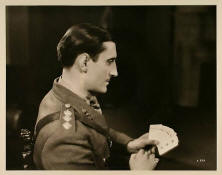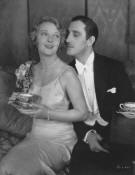The Flirting Widow
(1930), 74 min. b&w
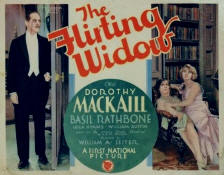
The Flirting Widow is a light-hearted,
entertaining comedy starring a young and handsome Basil Rathbone and actress
Dorothy Mackaill. Dorothy plays Celia, the oldest of three daughters in the
Faraday family. She's about 28 years old and not yet married, so in the culture
of that era, she was considered an old maid. Celia's father depended on her to
run the household and take care of him. But he hadn't given up on the
possibility that Celia could marry one day.
Celia's younger sister Phyllis is eager to marry her boyfriend Bobby, but
when Bobby asks Mr. Faraday for permission to marry Phyllis, Faraday says no. He won't allow
Phyllis to marry before her older sister. So quick-thinking Celia invents a fictitious fiance. Celia has just returned from a week away, so she
tells the family that she met a Colonel John Smith, and they fell madly in love and got engaged. She tells her family that Col. Smith has sailed with his regiment for Arabia. Celia even writes a letter to her fictitious lover (nicknamed "Wobbles"), never intending to mail it.
Unknown to Celia, her sister finds the letter and mails it. And of course there just happens to be a real Colonel John Smith (played by Rathbone) stationed in Arabia, who upon receiving a love letter from a stranger is puzzled and curious.
Meanwhile, since Celia is at least "engaged," Father allows Phyllis and Bobby to marry. Once that has been accomplished, Celia decides to "kill off" John Smith so the family will stop asking about him.
Eight months after inventing John Smith, Celia places a notice in the paper saying that he died of wounds sustained in battle.
When the real Col. Smith arrives back in England he pays a visit to Celia's family to find out about the sender of the love letter.
He arrives on the day that the death notice appears in the paper. The family assumes he has come to personally deliver the bad news about Col. Smith's death. Smith
plays along and tells them his name is Colonel Vaughn, and pretends to be a close friend of the fictional John Smith. He quickly discovers why Celia invented a lover, and contrives to spend the evening with Celia. It's an amusing situation. Celia knows that since she invented John Smith, he cannot have a close friend. But she cannot tell anyone that she lied about having a fiance. And she cannot figure out who Col. Vaughn is and how he knows about
her imaginary Col. Smith.
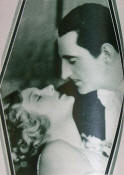 |
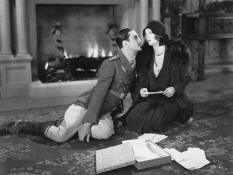 |
Rathbone, as Colonel Vaughn, plays along and describes the battle and how Celia's beloved Colonel Smith died. Celia and Vaughn are attracted to each other, but when Celia realizes that Vaughn is lying, she becomes angry with him. Confused by her emotions, she tries to flee on the midnight train to London. Before she can leave, Vaughn/Smith confronts her, tells her who he really is, how he feels about her, and completely charms her. The film ends with Celia and Smith in a passionate embrace.
The Flirting Widow
Amusing: Sometimes DraggyIt's all been done before in various
forms, yet this Dorothy Mackaill vehicle comes through the production mill
as a pleasant, innocuous enough attraction.
Nothing heavyweight about "The Flirting Widow" from any angle. The mob
probably won't remember much about the film except that it afforded an
hour or more of light entertainment, occasionally weighed down by skimpy
situations, stretched thin over footage that has trouble carrying the
load. For warm weather patronage, however, this production is nicely
tempoed and bids fair to give general satisfaction.
The yarn is English and is based on "Green Stockings" by A.E.W. Mason.
Miss Mackaill plays the part of the oldest of three daughters, the others
being the attractive Leila Hyams and Flora Bramley. Leila, the middle
daughter, is married. Flora isn't, but wants to and would if Claude
Gillingwater didn't adhere to the old-fashioned idea about marrying off
the oldest before the youngest takes the step. Dorothy is eager for the
leap, but it seems she hasn't met anyone who measures up to her standard.
But when Flora and her beau, Anthony Bushell, attempt to palm her off on
William Austin, Dorothy hurdles the situation by declaring she is in love
with a Colonel John Smith, British army officer then Arabia-bound to quell
a native rebellion. The family, tickled into several shades of pastels
over the news, makes her write a letter and mails it when Dorothy is
trying to trump somebody's ace. The obvious happens, of course. There is a
Colonel Smith, smartly as well as suavely played by Basil Rathbone who
gives a lot of women this scribe knows chilly shivers of excitement
whenever his celluloid physique fills the screen.
Smith, or Rathbone, reads through the gag and makes up his mind to milk
it for all it's worth. He does, is successful in giving the audience a
number of laughs and in making Mackaill go for him. Storywise, that's all.
Miss Mackaill's performance is workmanlike, but unmarked by either high
or low spots. Just an experienced trouper going through an easy role.
Rathbone, as note, does very nice work. Flora Bramley's ancestry must have
made its mark in oil; she's that gushy. Emily Fitzroy has little to do and
does that way. Austin is often amusing as the damfool Englishman, but is
permitted to overact heavily.
Reviewed by "Red" Kann
Motion Picture News, June 7, 1930,
p. 137 |
The Flirting Widow is based on A.E.W. Mason's play Green Stockings.
In 1911 the play was performed on Broadway (New York City) and also toured North
America, playing in major cities, including Ottawa, Toronto, Boston, and
Washington DC. It does not appear to have been performed on the London stage.

3-sheet poster. style B |
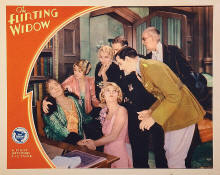
lobby card |
"Green Stockings" refers to the
old English country custom that requires an unmarried elder sister to wear green stockings at the
wedding of her younger sister. Some parts of the country even required
that the unmarried elder sister should dance at her younger sister's
wedding in her stocking feet. The purpose of this bizarre custom seems to
have been to shame the older sister. Wearing the green stockings and
dancing in them draws attention to the woman's unfortunate inability to
find a husband. But there was also a tradition that if a young man took pity
on the girl dancing in green stockings he could join her in
the dance. Doing so was a declaration of his desire to
marry her, and since the society valued married women more than unmarried
women, her refusal would be unlikely.
By the 20th century, most folks viewed the
"green stockings" custom as quaint and old-fashioned. It may not have been enforced on elder
sisters very often. But Celia's father was old fashioned, and he had
required Celia to wear green stockings at her sister Evelyn's wedding.
Celia's invention of fiancι John Smith not
only allowed her younger
sister to marry, but also changed the way she her family treated her. She
was tired of being "Good old Celia." Celia who doesn't want things and
Celia who looks after things and Celia who doesn't mind things and Celia
who attends to things. Celia was tired of being taken advantage of and
being treated like a servant. By demonstrating that she wasn't a
spinster whom no man wants to marry, Celia earned the family's respect.
The Flirting Widow
First National Picture
(Review at W.B. Downtown) This
picture has its moments of hilarity, and when they are good, they are
very, very good. But it also has some long arid stretches, and it
frequently ha promises of fun to come which it fails to deliver. In other
words, with this situation and this cast, "This Flirting Widow" should
have been both funnier and more appealing than it was. the humor arises
from the intrinsic developments of the plot provided by the stage play
"Green Stockings" and not by what was done to it by First National.
The picture in the main follows the stage play, telling the story of a
girl who, to escape reproaches for not marrying, invents a fictitious army
colonel as her betrothed. She writes to him, and it then develops there is
really such a man. His arrival to learn what it is all about provides the
comedy, and the fadeout is of course the happy one.
EXHIBITORS' VIEWPOINT:
A mediocre picture that promises no better at best than mediocre returns.
And this only where Dorothy Mackaill is a draw.
PRODUCERS' VIEWPOINT:
Credits here are slight. William Seiter directed, but disclosed only
routine ability. The scenario was bad, missing many opportunities, and
frequently having draggy dialogue.
CASTING DIRECTORS' VIEWPOINT:
Dorothy Mackaill worked hard, but she has had so much better opportunities
that she did not shine. That is except in certain sequences. In a few she
was most appealing.
Basil Rathbone, opposite her, played with his usual poise, but the part
didn't give him one-tenth the opportunity he has had in other pictures.
Emily Fitzroy overdid in her role, most particularly in a drunk
sequence. It wasn't funny, some way. Miss Fitzroy's hard menace is so good
it's a shame to waste her in this kind of part.
Claude Gillingwater was very good as a crusty old man, while completing
the cast well enough were Anthony Bushell, Leila Hyams, William Austin,
Laura Bramley and Wilfred Noy.
Frederick.
Inside Facts of Stage and Screen,
May 31, 1930
|
Praise for The Flirting Widow:
"The story is of British people in their own country and the result is a most
amusing and enjoyable affair." Weekly
kinema guide (London suburban reviews and programmes), December 15, 1930
"Dorothy Mackaill scores a bull's eye in this clever comedy." Photoplay,
January 1931
"Well acted and quite amusing comedy of family life." Educational
Screen, September 1930
The Flirting Widow Dorothy Mackaill is seen at
her best in the newest comedy, "The Flirting Widow." Based on the story,
"Green Stockings," by A.G.W. Mason, First National has produced one of the
smoothest comedies of the season.
The story concerns an English family whose rule is, that the youngest
daughter cannot be married until after the older sister. Should she do so,
the older sister shall wear green stockings, which is a badge of dishonor.
In this instance the older sister invents a mythical fiance who turns
up at a most inopportune time, but true love runs true to form and she
weds her mythical lover.
W.A. Seiter directed this picture and he injects his whole personality
into it, which means much.
Dorothy Mackaill, who plays the older sister, is at her best, while
Flora Bramley, who enacts the younger one, is the spirit of youthfulness.
The palm must be given to that sterling actor, Basil Rathbone for his
performance of the "mythical lover." Where another actor might have
overacted and spoiled the illusion, he plays his role with suave and
telling emphasis.
Leila Hyams, as another sister, is, as usual, splendid, and William
Austin, as the "silly ass," is most amusing.
Claude Gillingwater adds much to the smooth performance as "the father"
while Emily Fitzroy as "Aunt Ida" gets "many a laugh," especially in a
drunken scene.
Anthony Bushell, who did such excellent work with George Arliss, plays
"Bobby" with much sincerity.
We mustn't forget Wilfred Noy as the "perfect butler." an old timer at
the camera, Norbert Brodine, showed us many new camera shots and
demonstrated a master's hand throughout.
Should Warner Brothers' Theatre continue to put on such good
productions as they have lately, they may be assured of the leadership
which they have assumed.
Arthur Forde.
Hollywood Filmograph, May 31, 1930, p. 18 |
"Mr. Rathbone, as usual his competent self, appears to great advantage as the
Colonel, and Miss Mackaill manages to pull through the ordeal as the innocent
victim of the Colonel's scheming." New
York Times, August 2, 1930
"The plot is weak but fairly amusing. Entertaining." Reviews by the Motion
Picture Committee of the Women's University Club, American Association of
University Women, July 1930
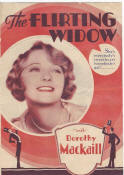
herald |
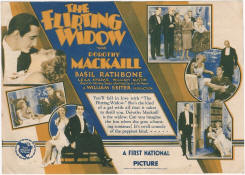
herald |
"Rathbone, showing a fine flair for comedy, and Miss Mackaill contributed
some very funny scenes in what was otherwise a dull picture." Michael
Druxman, Basil Rathbone: His Life and His Films, 1975
"The people who really make this movie are Mackaill and Rathbone. ... [Rathbone]
proves a surprisingly accomplished farceur and romantic comedian." Mark
Gabrish Conlan, "The Flirting Widow (Warners as 'First National,' 1930),"
Movie Magg,
July 8, 2012
The Flirting Widow Light, sketchy, pitter-patter
story for the screen. Well cast, but mechanically directed. "The Flirting
Widow," an exaggerated title for the original story's "Green Stockings,"
slim for the key houses and really built for entertaining in the
neighborhood theatres.
Old Man Faraday believes the oldest daughter should marry first. Celia,
the eldest, unknown to all but Aunt Ida, frames it so that Evelyn and
Martin can beat her to the altar.
Writing to one Colonel Smith, supposedly a mythical character, Miss
Mackaill gets a series of laughs by her nicknaming him Wobbles. Audience,
in on the secret with the aunt, is interested when the live Smith gets the
first letter, one mailed unintentionally. Then Celia's trick of inserting
a death notice about smith in the paper and her feigning sorrow gets
another rise.
When Smith shows up, along with a course of mathematically times and
correct coincidences, he automatically falls into line and poses as a
fellow buddy of the "dead" officer. There is a certain amount of fun in
the masquerading of Rathbone and Mackaill. It's a little too long and too
bromidic of dialog to pack the laughs which a situation of this kind
should.
Emily Fitzroy, as the aunt, provides one of the most comic moments when
she downs a goblet of spirits and goes through the lurch routine.
Love interest, despite the reaching situations, comparatively slight.
Waly.
Variety, August 6, 1930, p.
38 |
The Flirting Widow is not currently available on DVD. It can
occasionally be seen on the Turner Classic Movies television network. It can be
purchased on VHS tape from
Roberts Hard to Find Videos
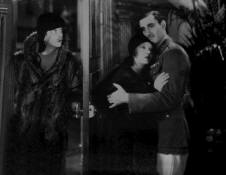
Raleigh (William Austin) tires of waiting for Celia and comes indoors to
find her in the arms of Colonel Smith. |
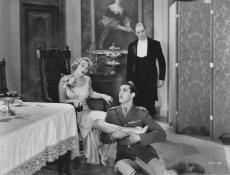
Martin, the butler (Wilfred Noy), is amazed at the antics of Celia and
Colonel Smith. |
See Page Two for more reviews and pictures.
.
|
Cast |
|
|
Dorothy Mackaill ... |
Celia |
|
Basil Rathbone ... |
Colonel Smith |
|
Leila Hyams ... |
Evelyn |
|
William Austin ... |
James Raleigh |
|
Claude Gillingwater ... |
Faraday |
|
Emily Fitzroy ... |
Aunt Ida |
|
Flora Bramley ... |
Phyllis |
|
Anthony Bushell ... |
Bobby |
|
Wilfred Noy ... |
Martin (butler) |
|
Sidney Bracey ... |
second butler |
| |
|
|
|
|
Credits |
|
|
Production Company ... |
First National Vitaphone Pictures |
|
Producer ... |
William A. Seiter |
|
Director ... |
William A. Seiter |
|
Screenplay ... |
John F. Goodrich and A.E.W. Mason (story) |
|
Cinematographer ...
|
Sid Hickox |
|
Film Editing ... |
John F. Goodrich |
|
Music ... |
Alois Reiser |
|
Orchestra Conductor ... |
Leo F. Forbstein |
| |
|
|
|
|














